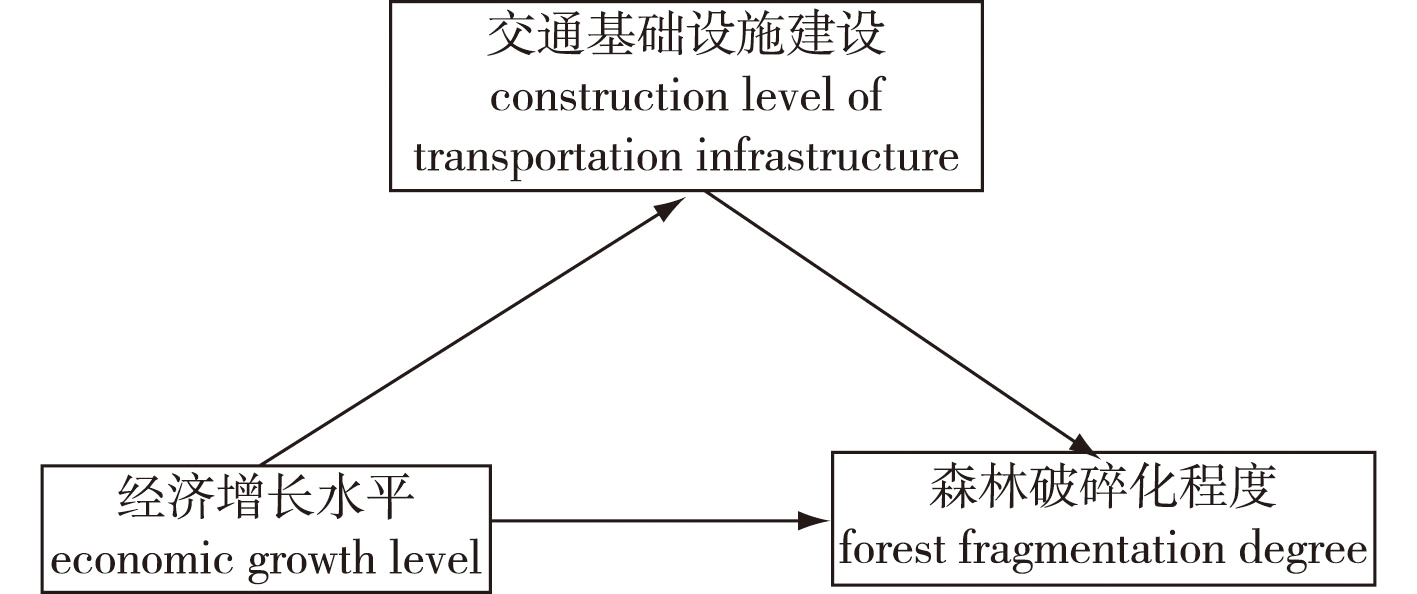 PDF(1543 KB)
PDF(1543 KB)


The impact of economic growth on forest fragmentation: a case study of Beijing-Tianjin-Hebei Region in China
LUO Yiyi, LI Lingchao, CHENG Baodong
Journal of Nanjing Forestry University (Natural Sciences Edition) ›› 2024, Vol. 48 ›› Issue (1) : 227-236.
 PDF(1543 KB)
PDF(1543 KB)
 PDF(1543 KB)
PDF(1543 KB)
The impact of economic growth on forest fragmentation: a case study of Beijing-Tianjin-Hebei Region in China
【Objective】The degree of forest fragmentation in 38 sample counties in the Beijing-Tianjin-Hebei Region was measured through satellite image data from 2000 to 2018. The impact of regional economic growth on forest resources was studied, and its internal impact mechanism was explored. The results provide a reference for the Beijing-Tianjin-Hebei Region to further realize a coordinated plan for sustainable development and environmental protection. 【Method】A model of the intermediary effects among economic growth, transportation infrastructure construction, and forest fragmentation was established through forest transformation theory, land use change theory, and growth axis theory, and the model was empirically tested. 【Result】In the relationship between the level of economic growth and degree of forest fragmentation in the Beijing-Tianjin-Hebei Region, every 1% increase in economic growth resulted in a 3% increase in forest fragmentation during the same period. In the relationship between economic growth and transportation infrastructure construction, every 1% increase in economic growth resulted in over 0.1% increase in highway density. In the relationship between traffic infrastructure construction and forest fragmentation, every 1-unit increase in highway density increased the number of forest patches in the region by more than 4. The mechanism test showed that in terms of economic growth affecting forest fragmentation, transportation infrastructure construction had a significant intermediary effect, with an intermediary degree of 23.255%. 【Conclusion】 The rise in economic growth significantly promotes forest fragmentation in the Beijing-Tianjin-Hebei Region. Improvement in economic growth can effectively promote the construction of transportation infrastructure and improve the distribution density of roads. The construction of transportation infrastructure significantly exacerbated regional forest fragmentation during the study period. In the process of economic growth, transport infrastructure construction correlated with an increase in forest fragmentation.

economic growth / forest fragmentation / transport infrastructure / intermediary effect / Beijing-Tianjin-Hebei Region in China
| [1] |
|
| [2] |
|
| [3] |
|
| [4] |
|
| [5] |
|
| [6] |
|
| [7] |
费文君, 刘思语, 高祥飞. 森林康养基地资源评价方法研究[J]. 南京林业大学学报(自然科学版), 2023, 47(2):187-196.
|
| [8] |
|
| [9] |
|
| [10] |
|
| [11] |
|
| [12] |
|
| [13] |
刘世梁, 安南南, 侯笑云, 等. 澜沧江下游景观破碎化时空动态及成因分析[J]. 生态环境学报, 2018, 27(7):1351-1358.
|
| [14] |
|
| [15] |
廖承锐, 吕国屏, 王涛, 等. 西藏河滩流动沙地植被恢复及物种多样性变化[J]. 南京林业大学学报(自然科学版), 2018, 42(2):89-96.
|
| [16] |
|
| [17] |
|
| [18] |
|
| [19] |
李鑫, 翁卫松, 李明诗. 太平洋西北部地区天然林景观动态及破碎化驱动力分析[J]. 南京林业大学学报(自然科学版), 2021, 45(3):174-182.
|
| [20] |
|
| [21] |
|
| [22] |
|
| [23] |
|
| [24] |
|
| [25] |
车通, 罗云建. 量化社会经济发展对城市景观破碎化的影响[J]. 南京林业大学学报(自然科学版), 2020, 44(1):154-162.
|
| [26] |
|
| [27] |
|
| [28] |
|
| [29] |
|
| [30] |
|
| [31] |
高翔, 龙小宁, 杨广亮. 交通基础设施与服务业发展:来自县级高速公路和第二次经济普查企业数据的证据[J]. 管理世界, 2015(8):81-96.
|
| [32] |
蔡新民, 刘金全, 方毅. 我国交通基础设施建设对经济增长的影响研究[J]. 经济纵横, 2017(4):70-76.
|
| [33] |
马德隆. “一带一路”交通基础设施投融资机制研究[J]. 宏观经济管理, 2020(10):56-63.
|
| [34] |
郭广珍, 刘瑞国, 黄宗晔. 交通基础设施影响消费的经济增长模型[J]. 经济研究, 2019, 54(3):166-180.
|
| [35] |
|
| [36] |
王晔, 张慧, 刘方正, 等. 道路网络对辽宁省森林生境的影响[J]. 科学技术与工程, 2015, 15(18):138-146.
|
| [37] |
李月辉, 吴志丰, 陈宏伟, 等. 大兴安岭林区道路网络对景观格局的影响[J]. 应用生态学报, 2012, 23(8):2087-2092.
|
| [38] |
|
| [39] |
方杰, 温忠麟, 张敏强. 类别变量的中介效应分析[J]. 心理科学, 2017, 40(2):471-477.
|
| [40] |
刘婧鸣, 侯现慧, 王占岐, 等. 耕地细碎化与耕地集约利用水平空间相关特征研究:以湖北省为例[J]. 中国土地科学, 2017, 31(12):51-59,2,97.
|
| [41] |
李凌超, 邓丹丹, 张鼎文, 等. 京津冀森林破碎化的社会经济影响因素分析[J]. 林业经济, 2021, 43(4):5-16.
|
| [42] |
|
| [43] |
赵鑫铖, 梁双陆. 中国区域经济福利的水平测度与增长测度研究[J]. 数量经济技术经济研究, 2020, 37(7):26-47.
|
| [44] |
田明华, 万莉. 经济发展、林产品贸易对木材消耗的影响研究[J]. 资源科学, 2015, 37(3):522-533.
|
| [45] |
|
| [46] |
|
| [47] |
|
| [48] |
戴平生, 陈建宝. 财政支出、电力消费与农民收入的时空特征分析[J]. 数理统计与管理, 2008, 27(4):571-578.
|
| [49] |
|
| [50] |
|
| [51] |
|
| [52] |
吴振华. 劳动报酬、消费升级与产业结构升级[J]. 工业技术经济, 2019, 38(11):101-106.
|
| [53] |
周鑫, 黄治昊, 张孝然, 等. 京津冀地区自然植被保护与自然保护区布局研究[J]. 生态科学, 2017, 36(1):64-71.
|
| [54] |
李秀彬, 赵宇鸾. 森林转型、农地边际化与生态恢复[J]. 中国人口·资源与环境, 2011, 21(10):91-95.
|
| [55] |
胡悦, 马静, 李雪燕, 等. 京津冀地区生态安全评价及障碍因子诊断[J]. 环境污染与防治, 2021, 43(2):206-210,236.
|
/
| 〈 |
|
〉 |